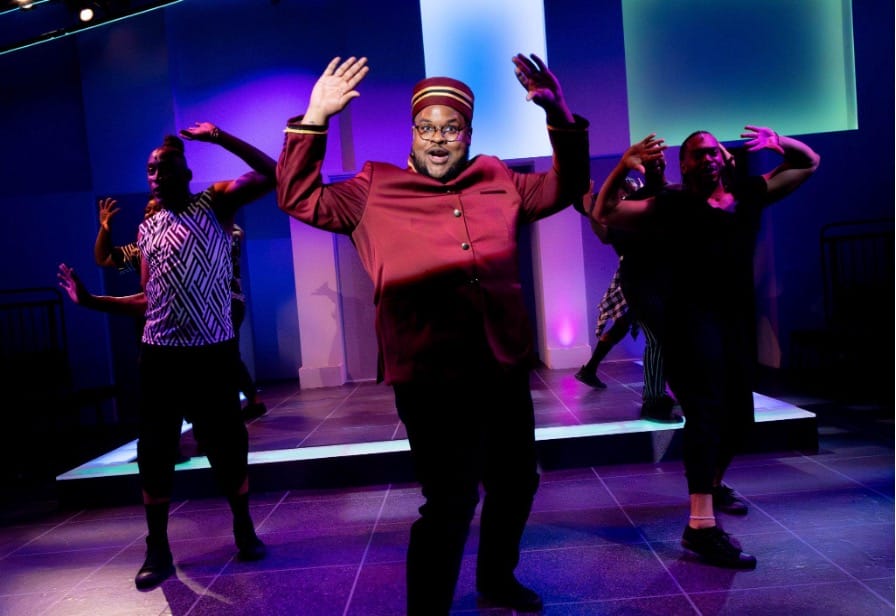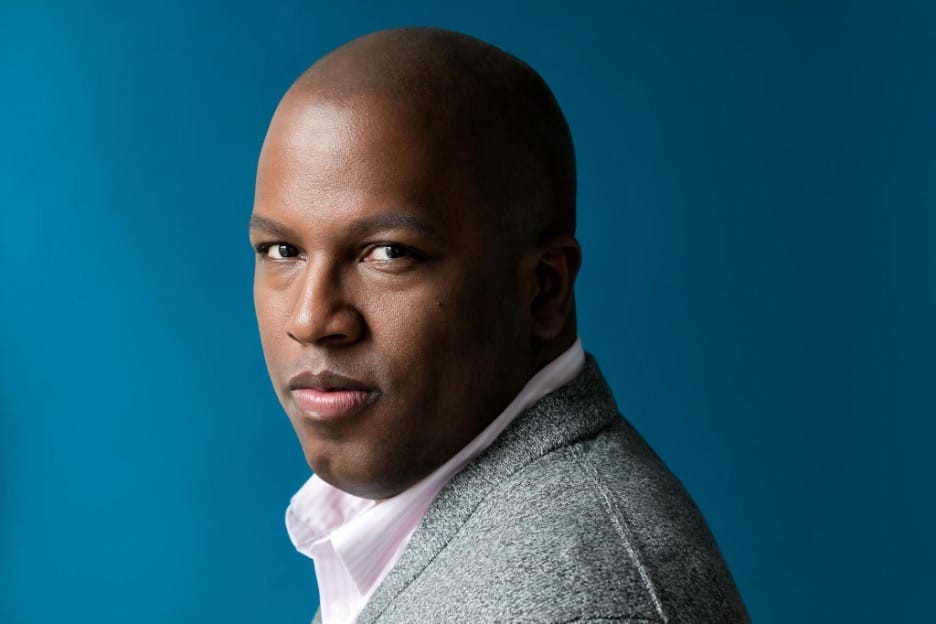“That’s what she gets!”
It’s been twelve years since two-time Tony and Pulitzer Prize-winning playwright Michael R. Jackson heard those words echo throughout the movie theater where he begrudgingly went to watch Tyler Perry’s 2013 film Temptation: Confessions of A Marriage Counselor. The protagonist, Judith, played by actress Jurnee Smollett, is diagnosed with HIV after engaging in condomless sex outside of her marriage.
“ I didn’t realize when I went to go see it that it was gonna have this crazy HIV plot device in it and that it was gonna be used in such an irresponsible and poorly written way,” Jackson said.” It just made me really angry.”
The cinematic moment harkened back to “Killing All The Right People,” a 1987 episode of the hit series Designing Women, which reflected at the time, widespread public sentiment regarding HIV as God’s punishment for homosexuality. Although fictional, both moments, along with the loss of two of Jackson’s real-life friends to HIV-related complications, inspired him to tackle the impact of religious-fueled HIV stigma in his magnum opus, A Strange Loop.
Frustrated with his day job ushering for Broadway musicals, a young, gay, Black writer decides to write a musical about a young, gay, Black writer who decides to write a musical about a young, gay, Black writer. Stuck in this “strange loop,” the protagonist takes the audience on a kaleidoscopic journey of identity, desire, and self-acceptance— backed up by an ensemble of “Thoughts” who call it like they see it in this “self-referential” musical.

Presented with a sponsorship by Gilead Sciences, A Strange Loop is onstage now through August 31st at Actor’s Express in Atlanta. Jackson’s critically-acclaimed musical delivers stinging critiques of Perry’s work, and the religious-based homophobia prevalent in Black communities that has allowed HIV stigma to thrive decades after the disease decimated Black and queer communities and nearly 30 years after antiretroviral drugs changed HIV from a death sentence to a chronic manageable condition.
Unlike 90s’ Broadway-juggernaut RENT, by late composer Jonathan Larson, which takes place at the height of the HIV epidemic and before scientific advancements like PrEP, the once-daily pill approved by the FDA in 2012, or now twice-yearly injection to prevent HIV acquisition, approved this year, A Strange Loop sits squarely in this new reality for Black gay men, with multiple references to Truvada—the first combination therapy prescribed for PrEP from Gilead—throughout the show. Jackson admits to having “complex feelings” about the game-changing drug.
“ I have seen up close what HIV can do to someone. But I also don’t necessarily feel as liberated as other gay men,” Jackson said, before sharing his aversion to casual sex. “There’s this duality of me wanting it but not wanting it. Losing someone as I did very much radicalized me on this topic, and so I take that very seriously, of people taking control of their sexual health,” he said.
A devastating and hopeful loop
A Detroit native raised in the Black church, Jackson came of age after the worst of the HIV crisis, and as a result, says he had “no sense of what to look for or think about” when he was faced with the imminent death of a graduate school classmate and close friend in 2019 from HIV-related complications. The friend, whose name Jackson declined to disclose out of respect for his surviving relatives, was 37 at the time of his death and was initially selected to be in charge of orchestrations for A Strange Loop.
“I noticed that his behavior just started to get a little erratic, and he was always very secretive, and I couldn’t quite figure out what was going on,” Jackson said.
A text exchange between the two, where the friend casually mentioned being in the hospital, was the first crack in a closely guarded secret about his health.

“I was like, why are you in the hospital? And he said, ‘I’m having some heart trouble.’ And I was like, heart trouble? He says, ‘Yeah.’ And then he was still casual. He goes, ‘Oh yeah, it’s related to my underlying HIV status.'”
In the same text exchange, Jackson says his friend revealed the progression of his HIV diagnosis to AIDS. And despite being aware of his HIV status for at least a decade, denial and shame led him to reject taking the antiretroviral drugs that would have suppressed the virus to undetectable levels in his body.
“He left the hospital against doctor’s orders. He went back to his apartment. He still wouldn’t tell his family. Everybody was operating under the impression he had this heart problem, which may have been technically true, but that wasn’t the full truth,” Jackson said.
A couple of weeks after Jackson’s friend returned home, he received a text message from his phone, but the sender was his friend’s sister, who shared the news of his passing the previous night.
“ He had just texted me the other day to tell me that he loved me,” Jackson said, as tears began to fall. “It felt so unfair, and I felt so stupid because I couldn’t believe that I didn’t pick up on it.”
Within three years, Jackson lost his friend, and fellow Broadway composer Michael Friedman, 41, who reportedly succumbed to the virus in 2017 after experiencing several opportunistic infections and after being diagnosed only nine weeks earlier.
“Secrecy, silence, stigma, and shame, these are the things that help this disease to continue to go on,” Jackson said.
To add insult to injury, the remains of Jackson’s friend were transported from New York City back to his hometown in Raleigh, NC, where, according to Jackson, the notoriously homophobic Bishop Patrick L. Wooden Sr., head pastor of The Upper Room Church of God in Christ, officiated the funeral. Jackson loosely based the minister character in A Strange Loop, declaring “AIDS is God’s Punishment” for homosexuality after Wooden Sr.

“There were just so many things going on that I felt so sad and angry about that A Strange Loop ended up becoming the container for,” Jackson said.
At his friend’s funeral, Jackson recalls “the pastor [Wooden Sr.] made this comment about how he was so sorry that his mother couldn’t save her baby.”
“I also heard that some of his gay friends were not allowed to be pallbearers,” Jackson recalls.
While infuriating, none of what Jackson experienced as a result of Wooden’s inappropriate comments during the funeral and in past homophobic sermons he discovered after doing a deep dive on YouTube surprised him. Instead, it seemed to be his long-standing experience in the Black church.
“ My childhood pastor never directly said AIDS is God’s punishment, but there would be so many sermons where it didn’t matter where it started, somehow it would get around to ‘them homosexuals and that reprobate lifestyle,” he said.
After all, according to the minister in A Strange Loop, “the only thing worse than dying from AIDS is living with it,” exemplifying decades of harmful rhetoric that continues in religious spaces.
After all the loss he’s experienced, one important wish remains for Black gay men and for Jackson’s friend whose life ended way too soon.
“I wish that my friend who passed away had [PrEP],” Jackson said. “If my show has any impact on Black gay men to embrace and take control of their lives in that way, I am proud.”













